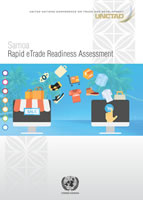
With the accelerated opening up of the economy and telecommunication developments resulting in more affordable and reliable high-speed Internet connectivity, the ICT and e-commerce sector has been identified by the Samoan Government as a critical enabler of economic growth and development in the country.
Despite advances in ICT uptake, Pacific Islands economies, including Samoa, face specific challenges mostly related to their geographical disadvantages in harnessing the potential of the digital economy and e-commerce.
The assessment revealed that issues associated with infrastructure are affordability – e.g., costs of mobile telephony or of broadband Internet – and accessibility issues outside urban areas. The lack of broadband penetration is perceived as an obstacle to leveraging development of other industries.
In the past decade, Samoa has made considerable progress in bridging the digital divide, with the Government significantly reforming its telecommunications sector. These reforms have had a dramatic impact on mobile usage in Samoa. Mobile phones and mobile Internet have become an everyday reality for a vast majority of the population, although costs and connectivity issues remain.
Since 2012, Samoa has put in place a series of initiatives aimed at promoting the development of e-commerce, but constraints still exist preventing Samoa from fully benefiting from the digital revolution. These include: a general lack of awareness among merchants and consumers, a slightly outdated legal and regulatory framework, and the absence of a national shared vision for e-commerce. Looking beyond strategies and regulations, the lack of payment solutions and cumbersome clearance procedures prevent full deployment of a conducive e-commerce ecosystem.
The Rapid eTrade Readiness Assessment shows that Samoa can benefit substantially from e-commerce if the country is able to accelerate adoption of key measures aimed to support the development of an e-commerce ecosystem (e-commerce strategy, regulatory framework) and private sector investment (affordability, access to finance).
E-commerce can enable a larger set of firms to export, increase their export intensity and diversify export markets. E-commerce also enables both individual consumers and firms to shop for the best deal globally, thus lowering prices and increasing quality of imported inputs.
This is central to export competitiveness. Strong political will, a truly supportive Government, a dynamic private sector, and a vibrant diaspora are key factors that can help ensure that Samoa is ready for the promise and call for e-commerce uptake.
This assessment, through the “way forward” action matrix, helps Samoa’s efforts to embrace the e-commerce revolution and identifies development partners that may be in a position to offer assistance.



